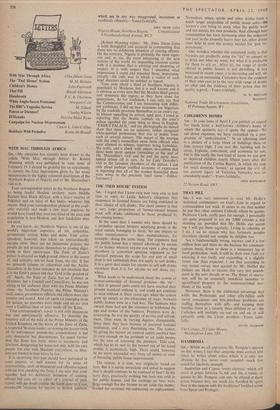THE 'TIED HOUSE' SYSTEM
SIR,—I regret that I have only now been able to find time to reply to Leslie Adrian's allegation that customers in licensed houses are being restricted in their choice of soft. drinks. The short answer is that a very large proportion of brewer-owned houses stock soft drinks additional to those produced by the owning brewer.
At the same time I wonder why there should he a prejudice against brewers supplying goods in the retail outlets belonging to them. No one objects to other manufacturers — shoe manufaCturers, for example—doing the same thing. The argument that the public house has a special advantage by reason of its licence whereas anyone can open a shoe shop anywhere (a somewhat specious argument as for' practical purposes the scope for any sort of retail shop is not unlimited) does not apply to soft drinks. It is a great deal easier for anyone to sell 'soft drinks anywhere than it is for anyone to sell shoes any- where.
What needs to be understood about the system of brewer-ownership of licensed premisesr—the is that in general pubs could not have reached their present standard without it, and could not continue to exist without it. Sixty years ago, when the system grew up (much to the reluctance of many brewers) public houses were in a had way. The licensees who owned them had not the resources to withstand the ups and downs of the business. Premises were de- teriorating. So was the quality of service and refresh- ment. They were, in varying degrees, disreputable. Since then, they have become an accepted national institution, and a very flourishing one. The system, by giving the brewer an assured outlet, enabled him to earn enough on his products to set aside money for the cost of renewing the premises. This cost, which has to be met by the brewer Out of his taxed profits, is particularly high. There could, however, be no more successful way from all points of view of financing 'public house improvement.'
The system, it is true, was Originally based on beer. But it is surely unrealistic and unfair to suggest that it should continue to be confined to beer? In the early days, practically nothing but beer was sold in the public houses, and the earnings on beer were large enough for the brewer to.set aside the money needed for eventual :reconditioning or,replacement. Nowadays, wines, spirits and other drinks form a much larger proportion of public house sales—the • brewer's aim being to stock what the public want and not merely his own products. And although beer consumption has been increasing since the reduction last year in the absurdly heavy beer tax, other drinks must help to earn the money needed for 'pub im- provement.'
One wonders whether the complaint yeally is that 'brewers are gradually using the "tic" to compel us to drink not what we want, but what it is profitable for them to sell us.' After all, the range of drinks offered in public houses is not dwindling. It has increased in recent years: it is increasing and will, we hope, go on increasing. Customers have the evidence of their own eyes as to the very wide range of drinks on offer and the evidence of their palate that the quality is good.Yours faithfully,
National Trade Development Association. 42 Portman Square, WI










































 Previous page
Previous page